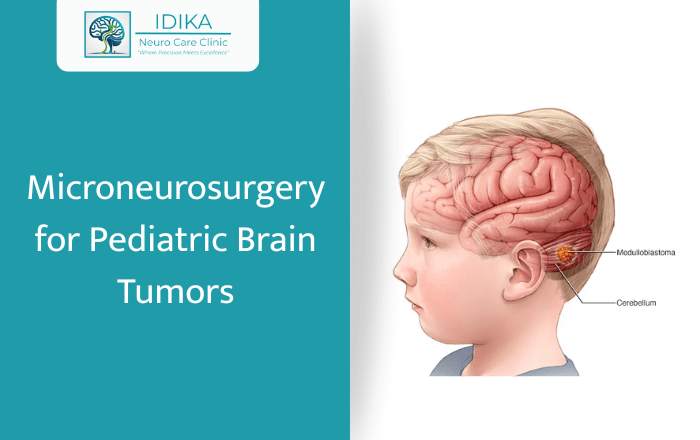When your child receives a brain tumor diagnosis, your world turns upside down. As a parent, you want answers and the best treatment available. You may have heard about microneurosurgery for pediatric brain tumors, but what does it really mean?
This guide explains everything you need to know about this specialized surgical approach and how it helps children with brain tumors.
Understanding Brain Tumors in Children
Brain tumors are the second most common cancer in children. They occur when abnormal cells grow in the brain tissue. Some tumors are benign (non-cancerous), while others are malignant (cancerous).
Common types include:
- Medulloblastomas (fast-growing tumors in the cerebellum)
- Gliomas (tumors that start in glial cells)
- Ependymomas (tumors in the brain’s lining)
- Craniopharyngiomas (tumors near the pituitary gland)
Warning signs every parent should watch for:
- Persistent headaches, especially in the morning
- Frequent vomiting without stomach illness
- Balance problems or clumsiness
- Vision changes or crossed eyes
- Personality changes or unusual behavior
- Seizures
- Developmental delays
If you notice these symptoms, consult a pediatric specialist immediately.
What Is Microneurosurgery?
Microneurosurgery is a surgical technique that uses special microscopes and tiny instruments to operate on the brain. The surgeon works through small openings while viewing the surgical area through a powerful microscope that can magnify up to 40 times.
▸ How it works:
The surgeon uses a high-powered microscope to see the brain in great detail. This magnified view allows them to carefully remove tumor tissue while protecting healthy brain areas. Special micro-instruments, some smaller than a few millimeters, help the surgeon work with extreme accuracy.
▸ Why it’s ideal for children:
Children’s brains are still developing, making precision crucial. This surgical approach creates smaller incisions, causes less trauma to surrounding tissue, and helps preserve normal brain function. Children typically recover faster and experience fewer complications compared to traditional surgery methods.
The Surgical Process
▸ Before Surgery:
Your child will undergo imaging tests like MRI and CT scans. These create detailed pictures of the brain and show exactly where the tumor is located. The surgical team uses this information to plan the safest approach.
▸During Surgery:
After your child is asleep under anesthesia, the surgeon makes a small opening in the skull. Using the microscope, they can see the tumor and surrounding structures clearly. The surgeon carefully removes as much tumor as possible while monitoring brain function throughout the procedure. Advanced navigation systems act like GPS, guiding the surgeon to the exact location.
▸ After Surgery:
Most children stay in the hospital for 3-7 days. The medical team monitors your child closely during recovery. Pain medication helps manage discomfort, and physical therapy may begin early to support recovery.
Benefits for Young Patients
Microneurosurgery offers several advantages:
▸ Greater Accuracy: The magnified view helps surgeons distinguish between tumor and healthy tissue, protecting critical brain areas that control movement, speech, and other functions.
▸ Smaller Incisions: Less cutting means less trauma, reduced blood loss, and lower infection risk.
▸ Better Recovery: Children often experience less pain, shorter hospital stays, and quicker return to normal activities. Scarring is also minimal.
▸ Improved Outcomes: Studies show higher success rates in tumor removal while maintaining brain function and quality of life.
What to Expect During Recovery
▸ At the Hospital:
After surgery, your child will wake up in the recovery room. Nurses monitor vital signs closely. Most children move from intensive care to a regular room within 1-2 days. You can be with your child during most of this time.
▸ At Home:
Recovery continues at home with wound care, medications, and activity restrictions. Most children feel significantly better within 2-3 weeks. Follow-up appointments ensure proper healing.
▸ Returning to Normal:
Many children return to school within 4-6 weeks. Some may need accommodations initially. Physical or occupational therapy helps if needed. Regular MRI scans monitor for any tumor recurrence.
Moving Forward with Hope
A brain tumor diagnosis is frightening, but today’s surgical techniques offer genuine hope. Microneurosurgery has transformed outcomes for children with brain tumors, allowing many to return to normal, active lives.
The key is finding a skilled pediatric neurosurgeon who understands the unique needs of young patients and has the training to deliver the best results.
Consult Dr. Harshal Agrawal – Child Neurosurgeon in Thane
If your child has been diagnosed with a brain tumor, Dr. Harshal Agrawal, a dedicated Child Neurosurgeon in Thane, can help. With specialized training in microneurosurgery for pediatric brain tumors, Dr. Agrawal provides caring, family-focused treatment.
Why families choose Dr. Agrawal:
- Extensive experience in pediatric brain tumor surgery
- Skilled in microneurosurgery techniques
- Modern surgical facilities and technology
- Compassionate care throughout your child’s journey
- Clear communication with families at every step
Your child deserves the best possible care. Schedule a consultation with Dr. Harshal Agrawal today to discuss your child’s diagnosis and treatment options. Don’t wait—early intervention can make a significant difference.
Contact Dr. Harshal Agrawal in Thane to book your appointment and start your child’s path to recovery.
FAQs
Q1: Is microneurosurgery safe for children?
Yes, it is considered one of the safest techniques because it allows surgeons to work with greater care and protect important parts of the brain.
Q2: What is the recovery time after microneurosurgery?
Recovery depends on the type of tumor and the child’s overall health, but many children return home sooner compared to traditional surgery.
Q3: Can all brain tumors in children be treated with microneurosurgery?
Not all brain tumors can be treated this way, but many common pediatric brain tumors are suitable for microneurosurgery.

